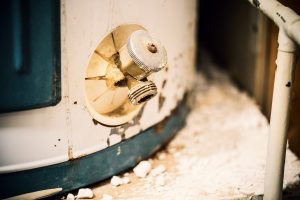Your water heater works quietly behind the scenes, delivering hot water whenever you need it—for showers, dishes, laundry, and more. But like all appliances, water heaters don’t last forever. Over time, wear and tear begin to take a toll on performance, efficiency, and reliability.
Understanding what happens to water heaters as they age can help you spot warning signs early, prevent breakdowns, and plan for a timely replacement before you’re left in the cold.
Declining Efficiency Over Time
One of the first signs of an aging water heater is a drop in efficiency. As sediment builds up at the bottom of the tank (especially in areas with hard water), the unit has to work harder to heat the same amount of water. This buildup acts as an insulator, forcing the burner or heating element to stay on longer and consume more energy. As a result, you may notice:
- Higher energy bills
- Longer wait times for hot water
- Inconsistent water temperatures
Regular flushing of the tank can help reduce sediment buildup, but eventually, the problem becomes too extensive to manage with maintenance alone.
Rust and Corrosion Begin to Set In
Water heaters are made from metal and constantly exposed to water and high temperatures—an environment ripe for corrosion. Newer tanks include an internal lining and a sacrificial anode rod designed to slow the rusting process, but over time, these protections wear down. Signs of corrosion include:
- Rusty or discolored hot water
- Water with a metallic taste or odor
- Visible rust on the tank or connection points
If you notice rust in your water, especially when running hot water, it’s often a sign that the inside of the tank is corroding—a sure sign that your water heater is nearing the end of its life.
Strange Noises and Rumbling
Another common symptom of an aging water heater is strange noises during operation. Rumbling, popping, or banging sounds are often caused by hardened sediment at the bottom of the tank. As water heats up and bubbles through the sediment layer, it creates noise and vibration. This not only affects performance but can also lead to tank damage over time.
Leaks and Structural Failure
As internal corrosion and pressure wear away at your water heater’s tank, the risk of leaks increases. Small leaks around fittings or from the tank itself can quickly escalate into water damage, especially if the unit is installed in an attic, closet, or other interior space.
Decreased Capacity and Hot Water Supply
Older water heaters may also experience a drop in capacity. Sediment buildup takes up space in the tank, meaning less room for hot water. Additionally, aging heating elements may struggle to maintain consistent output.
This is particularly noticeable in households that have grown over the years—what was once an adequate 40-gallon tank may no longer meet the needs of a busy family.
When Should You Replace Your Water Heater?
Most traditional tank-style water heaters last between 8-12 years. Tankless models can last longer, but they, too, eventually show signs of wear. If your water heater is over 10 years old and experiencing any of the issues above, it may be time to start planning for a replacement.
Upgrading to a newer, energy-efficient model can improve performance, lower utility bills, and give you peace of mind knowing your hot water supply is reliable.
Contact Affinity Gas Services today to schedule an appointment for water heater repair or installation with our professionals. We’re “The Gas Efficiency Experts.”

